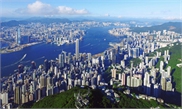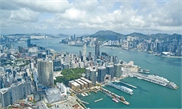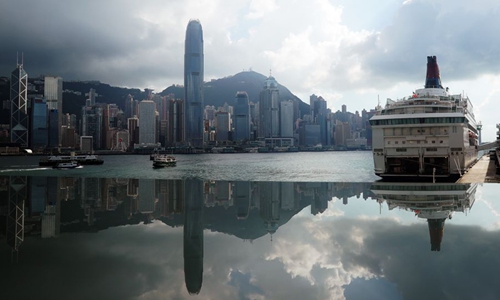
Photo taken on Aug. 27, 2019 shows the scenery of the Victoria Harbour in Hong Kong, south China. (Xinhua/Li Gang)
Chief Executive of China's Hong Kong Special Administrative Region (HKSAR) Carrie Lam said Tuesday that more relief measures will be rolled out soon to help businesses and residents weather out economic hardship, following three rounds of such policies adopted during the past months.
As multiple data have revealed a grim economic circumstance, the HKSAR government will closely monitor the situation and carry out new relief measures, Lam told a press conference.
The HKSAR government has allocated about 20 billion Hong Kong dollars (2.55 billion U.S. dollars) in total since August in hopes of reviving an economy that has stepped into a technical recession.
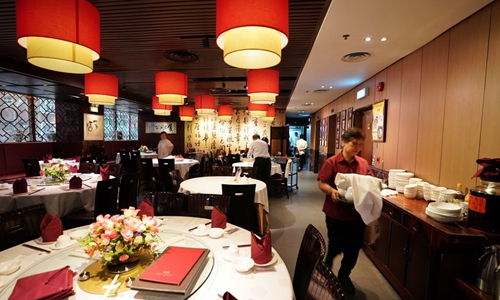
Photo taken on Aug. 20, 2019 shows an indoor view of Hangzhou Restaurant in Hong Kong, south China. (Xinhua/Qin Qing)
GLOOMY ECONOMY
"We lost millions of Hong Kong dollars each month recently," a server of a spicy crab restaurant in Causeway Bay said. At lunchtime, there were only a few diners at the restaurant that just opened in July.
Wong Ka-wo, president of the Hong Kong Federation of Restaurants and Related Trades, said Hong Kong's catering sector is expected to lose 17 billion Hong Kong dollars (2.17 billion U.S. dollars) from June and December, and about 400 restaurants have closed down so far.
"The official unemployment rate in Hong Kong's catering industry in October is 6.1 percent, but my estimate is 7 to 7.5 percent, that is nearly 22,000 people lost their jobs in October," he said. He was afraid that over 1,000 more restaurants may not survive the current crisis by February.
"Business sentiment has turned pessimistic, weighed down by external uncertainties and local violent incidents that have dragged on for months," HKSAR government Financial Secretary Paul Chan said at a meeting of the Legislative Council, stressing that industries from tourism to catering are struggling in the bleak winter.
Retail sales decreased 24.3 percent from a year ago in October, the largest decline for a single month on record. Visitors to Hong Kong tumbled 43.7 percent year on year in October.
The economy dropped 2.9 percent in the third quarter, sharply down from the 0.4-percent growth in the second quarter.
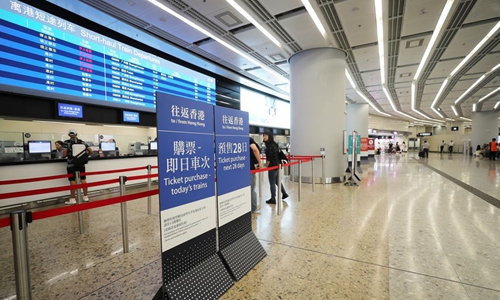
Photo taken on Oct. 2, 2019 shows a view of West Kowloon High-speed Railway Station in Hong Kong, south China. (Xinhua/Lu Ye)
PESSIMISTIC SENTIMENT
"Three months? Half a year? I have no idea when my life can be normal again," a tour guide surnamed Wan said. The veteran tour guide who had gone through hard days of the financial crisis and the SARS outbreak felt that he could not make it this time.
With no tour groups to receive since June, Wan has started to take part-time jobs at metro stations and restaurants.
Tourism was one of the hardest-hit sectors by the months-long violence. "There is no sign of a recovery in December, instead a 30-to-40 percent drop in the tourism revenue will be likely," a lawmaker and tourism industry insider Yiu Si-wing said.
"Even if the situation settles down a little bit, the sector is unlikely to return to the previous level."
The HKSAR government has cut its gross domestic product forecast for 2019 to a negative 1.3 percent, which will be the region's first annual decline since 2009. The unemployment rate, which has already spiked to 3.1 percent during the August-October period, will likely rise further in the coming months.
Hong Kong will likely register its first budget deficit in 15 years for the current fiscal year ending on March 31, as the economy has slipped into a technical recession amid the prolonged social unrest, Paul Chan said.
Despite possible fiscal deficits in the coming one or two years, it is high time the HKSAR government made full use of the wealth and surplus accumulated in the past to relieve the burden on residents, Carrie Lam said.
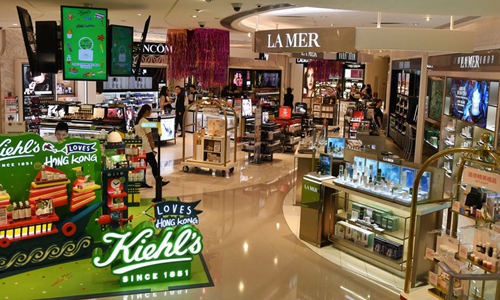
Few tourists are seen at a duty-free store in Causeway Bay of Hong Kong, south China, Aug. 20, 2019. (Xinhua/Qin Qing)
VIOLENCE MUST END
Lam said she hopes violent incidents will stop as soon as possible to give the economy a chance to recover.
Analysts pointed out that relief measures can only help businesses keep afloat for a longer time and it is the end of violence and the restoring of peace that will allow people to return to their normal lives and push the economy back on track.
Chan also expressed concerns about looming challenges to the economy in the next year and even bigger impacts on people's livelihood, as well as the dented confidence of international investors.
"We need concerted efforts from all sectors of the community to stop violence and chaos and facilitate the economic recovery," Chan said. "So that order can be restored, residents can live a peaceful life again and businesses can operate normally."
Multiple districts in Kowloon descended again into chaos over the weekend as rioters hijacked public events and resorted to destructive acts like building barricades on roads, setting fires and vandalizing public facilities.
